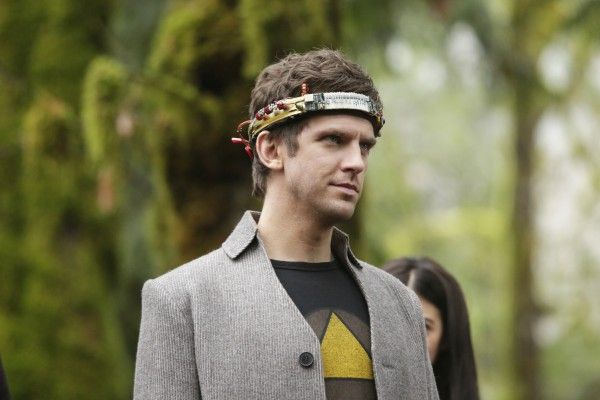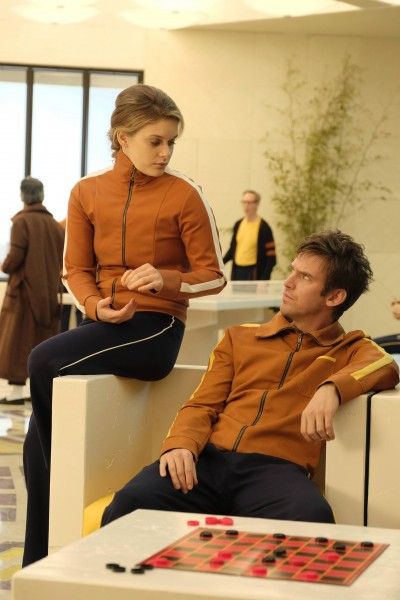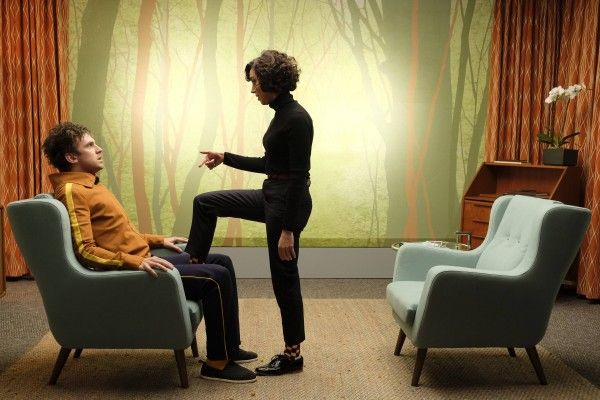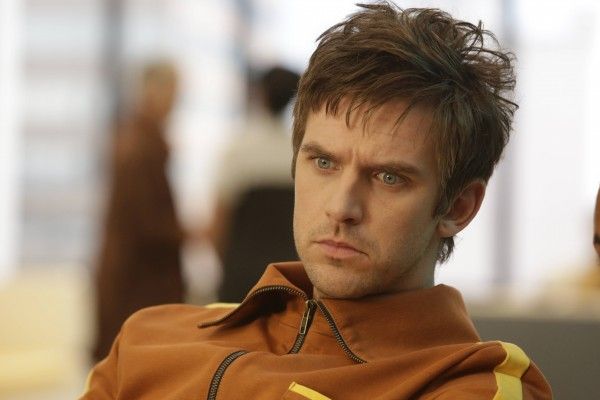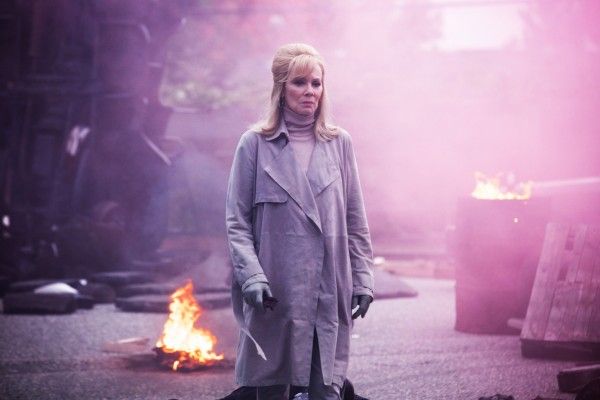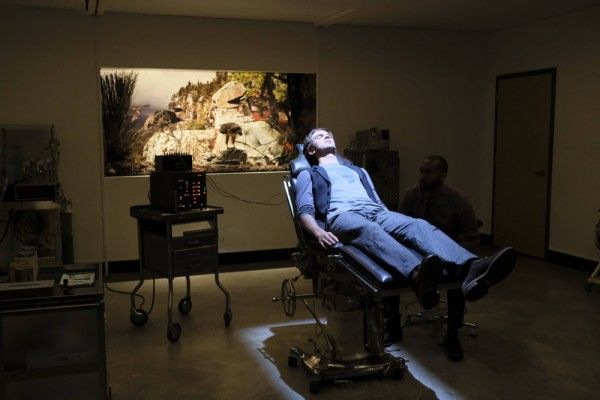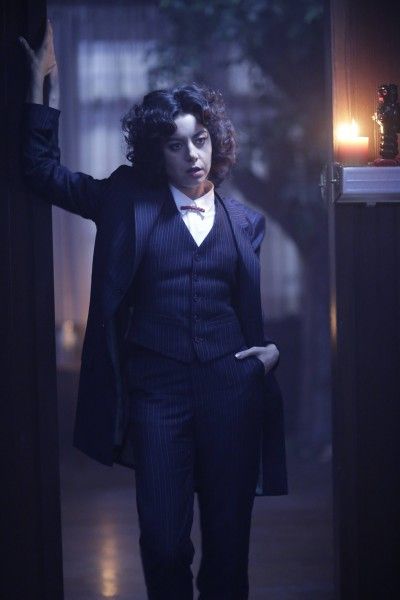From show creator Noah Hawley (Fargo), the FX series Legion, based on the Marvel comics by Chris Claremont and Bill Sienkiewicz, returns with a 10-episode second season on April 3, with all new levels of weird and wild. Picking up approximately one year after a mysterious orb appeared and took David Haller (Dan Stevens) away to an unknown place, he’s not only trying to figure out what’s happened in the time that’s passed, but he’s also dealing with the fact that he’s not really schizophrenic, like he was lead to believe, and could instead be the most powerful mutant who ever lived. At the same time, David must learn to accept who he is without the parasitic Shadow King, aka Amahl Farouk, within him and now inside of a new host.
Back in October 2017, Collider (along with a handful of other outlets) was invited to the relocated, top-secret Los Angeles set for a press junket, where we got to tour the various production departments, check out the new sets, and chat with the cast and creative team. While there, we participated in a roundtable interview with Dan Stevens, where he talked about how the time jump is affecting everyone, the unconventional romance between David and Syd (Rachel Keller), David’s internal vs. external conflict, his character’s evolving abilities, why he loves the ambiguity of the story they’re telling, the potential in David’s backstory, and whether Season 2 might provide some clarity. Be aware that there are some spoilers discussed.
Question: In Season 2, we meet up with David Haller, a year after we last saw him. How has that year changed him? Where is he at, when we see him again?
DAN STEVENS: For David, it hasn’t been a year, so he’s getting his head around that, for a start. For everybody else, it’s been a year and a lot has happened in that year. David has had another strange experience. He thought his problems maybe were solved with the expulsion of the Shadow King, but actually, it’s not that simple. So, far less time has passed for David. When we find him, he’s coming to terms with a whole new bend on reality.
With a year having passed for everyone else, but not for David, how will that affect things between him and Syd?
STEVENS: That’s a really interesting shift and turn for their relationship. We do see a maturing and a deepening of that relationship, but the great issue of trust comes along. Anybody who gets into a relationship with somebody like David has to assume a certain amount of license with the truth, or certainly a perception of reality. In some of these situations, it seems that David is just flat-out lying, and even he’s not sure if he’s telling the truth some of the time. That complicates the relationship, for sure. They have to work through some of those issues together.
Noah Hawley has said that this show doesn’t need to make sense, as long as you’re engaged with David and Syd’s love story. What’s been the key for you, in building that relationship, on screen?
STEVENS: I think it’s always interesting to develop long-running romantic relationships with the classic will they or won’t they trajectory. This being Legion, it obviously takes a slightly different angle on that. It asks some quite complex questions about relationships. Putting David in a relationship with anybody is a fascinating dynamic, and you have the incredible obstruction with not being able to touch, so there are these psychic spaces that they continue to occupy. The mindplay that goes on in relationships is fascinating, and it fascinates Noah, as a writer. Putting that in our universe, it just gets weirder.
What’s it like for David, now that there’s no longer an internal villain and it’s much more external?
STEVENS: There’s still a lot of internal conflict in David. If you know the comic books, there’s still quite a few characters left in there that we’ve gotta deal with, at some point. Shadow King was a big deal, and there are some structural changes. The structure of the components of David have been reshuffled and they’re reconfiguring, at the same time that there’s this external threat and everybody is becoming much more aware of that. There’s a partnership with Division 3 that wasn’t on the cards, last time he checked. That’s strange. It’s an interesting thing where everybody assumes that this externalization means that everything is pretty straight forward and everything is gonna be great, and we’ll solve this war situation, but it’s never that simple.
How is David evolving, free of the Shadow King?
STEVENS: If you look at illness, you have somebody’s identity with an illness, and then their identity without that. What remains, and how attached to that was he? What’s the dynamic there? David was fond of Lenny, in a weird, hostage-y way, and he feels that absence, so he’s dealing with a bit of that, at the same time that he’s dealing with Syd and her trust of him.
Without Lenny as something of a sounding board, is there anyone filling that space for David now, or does he have to internalize that more?
STEVENS: David internalizes quite a lot, anyway. He always has done that, and there is still definitely an external dialogue going on with Lenny and with some other characters, but the conflict resolution has become internalized a bit more. He’s always trying to be well and as normal and high-functioning as he can, but it’s not easy.
How are David’s mutant abilities a reflection of or connected to his emotional life?
STEVENS: When looking at superpowers, in these paradigms, there’s always the evolution of the baby giraffe stage of not really knowing how to wield these things, and then there’s that flush of ego where you think you’re invincible and can do all these things. We saw a bit of that in Season 1, and that continues in Season 2. He also starts to feel that maybe he’s being used a bit, as a weapon, and that maybe nobody was actually interested in him, after all, because it’s really just his abilities. It’s an interesting take on that kind of predicament. He certainly runs up against some characters that he can’t fully manipulate, in the way that he seems to be able to manipulate most people, which is an interesting obstruction. There are a few of them, and it gets very annoying for him.
Are you getting more comfortable with not having all of the answers on this show?
STEVENS: I love ambiguity and I hope audiences are entertained by that. I wouldn’t watch a show that told me everything in hour one. If I got the joke, or all of the information, in an hour, than I wouldn’t watch the other nine or 20 [episodes]. I really enjoyed the response to Season 1, that people have felt wonderfully confused by this show and rewarded in a visual way, hourly. There’s a lot going on. Like a great novel, it’s something you want to dive into and turn the page and find out. You don’t really care how many pages there is, there’s just something delicious about that journey.
How has working with Noah Hawley changed your approach to acting and to how you view art, in general?
STEVENS: In terms of a preparedness for anything and a certain amount of presence on set, I’ve learned to not necessarily come in with too many preconceived notions. This show being what it is, the ground does shift. We’ll be working on Episode 3 and the script for Episode 5 will come in, and it will change the way I’m thinking about Episode 3, while we’re shooting it. There’s this constant reconfiguring going on, which is the nature of the show. David has, throughout his life, had to be prepared for all eventualities for extremely absurd situations to be real, and vice versa. That presence that’s required to handle what he goes through has been really exciting, and that’s fed into other things that I’ve been doing.
What kind of back-and-forth do you have with Noah, when it comes to the character? Do you have any input, when it comes to the show?
STEVENS: No, that’s very much up to Noah and Nathaniel [Halpern], really. It’s really interesting to have the writers around us more, this year. The proximity to L.A. is great for that. I’m finding that the feedback loops are tighter. If there’s a certain dynamic that develops on set, or a certain storyline that jumps out while we’re making it, a couple episodes down the line is influenced by that, as they’re watching the stuff come in. But it’s not the sort of thing where I go to Noah and say, “I wanna do this!” Although, Aubrey [Plaza] throws in some interesting things. She’s told them that she wants to ride a horse, so we’ll see what happens with that.
With Melanie (Jean Smart) stepping back from the leadership role this season, how does that affect David?
STEVENS: That’s a really diplomatic way of putting what she’s going through. Looking at the crumbling of an old order, or an order that somebody was trying to impose on reality for him, some of those rugs have been pulled away. He’s often had an issue with authority, but when it proves itself not to be authority, that’s an alarming point to be at. If you confess to being wrong, are we suddenly on the same page? How does that dynamic work? She’s definitely less in charge than she was.
Now that they’re working with Division 3, what is David’s take on Clark (Hamish Linklater)? Is he keeping him at arm’s length?
STEVENS: A little bit. Clark and he had a sympathetic connection [in Season 1]. The alliance with someone like Clark is not so surprising, but there are some other characters that are attached to Division 3 that we meet, that are a bit more out there. We still have to un-peel the onion of what this thing really is and who’s involved. David is pretty ready for most things, but there are still some things that take even someone like him aback, which is fun.
In Season 1, you had fun with a little wink to David’s connection to Professor X.
STEVENS: With the actual wheelchair from The X-Men movies, by the way, which was awesome. It came up to Vancouver in a special crate and there was almost a ceremony, as it was un-boxed. It was really cool.
With David’s backstory still a part of the show, what potential is there to explore that?
STEVENS: It’s always there and it’s always plaguing him or ringing bells in the background of whatever is going on. It’s less at the forefront of his mind, at the beginning of this season, but it definitely comes into play, as we move on, as it does naturally for people who discover that they are adopted. It’s an intriguing prospect, I’ll say that.
Season 2 is exploring what is normal and what is reality, which is a very philosophical thing to look at, especially in the context of the time we’re living in. Has this brought you any insight into what that means, as well as what subverting that means?
STEVENS: It’s always interesting, no matter how abstract a piece. Performers can’t help but be influenced by the elements around them, in their world, and the world has become an infinitely more strange place than when we started shooting Season 1, even. The concept of the spread of ideas and the contagion of unreality, or the manipulation of reality, is what our show is all about. If that happens to fit with the times, than it’s maybe more than just a coincidence. I don’t know.
There was an enigmatic quality to the first season, but we got some clarity on things, by the end of it. Does Season 2 have that same quality?
STEVENS: Definitely! I’m glad that you achieved some clarity by the end of Season 1, but I don’t think we wanted to give total clarity, at all. Things deepen and expand. As things get more mature, in terms of the level of the relationship [between David and Syd], on a macro level, things get even more epic. There’s a micro/macro expansion going on, which is fascinating to play with, as well. Yo-yoing between those two things for David is whiplash-inducing, but that’s part of the fun of the show and the role, really.
Legion returns for Season 2 on FX on April 3rd.


